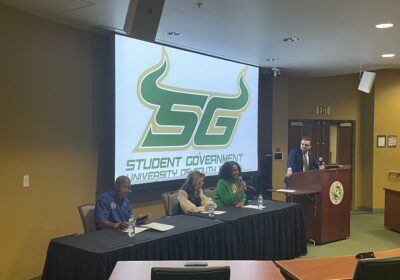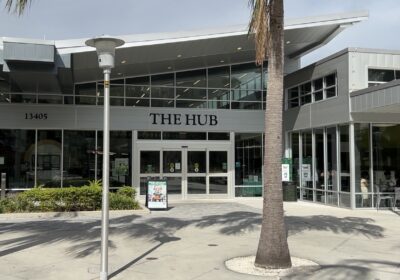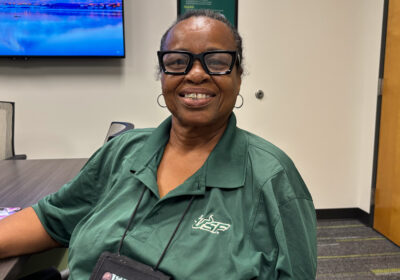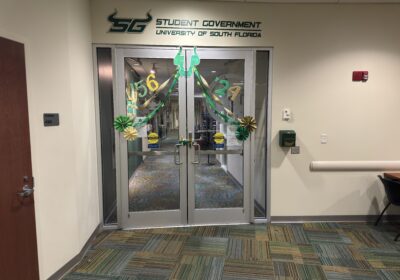From Florida to Spanish royalty: USF professor’s work impacts overseas
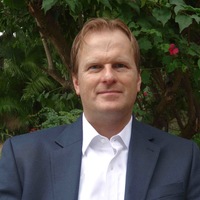
When J. Michael Francis changed his major to history his sophomore year in college, he never imagined over 30 years later his work would be honored by the King of Spain, and he would enter the rank of Officer’s Cross of the Order of Isabella the Catholic — two levels below the king.
Francis, a USF professor in Florida studies in the College of Arts and Sciences, received recognition Oct. 28 from King Felipe VI of Spain for his work uncovering Spanish history in St. Augustine.
Mail had been piling up in Francis’ office while working remotely, and he had not yet visited to collect it due to COVID-19 precautions. When he did, he noticed a letter from the Consul General of the Spanish Consulate in Miami.
Opening the letter, Francis realized the contents were written in Spanish and included the words “By royal decree.” The letter announced he was nominated to enter the Officer’s Cross rank of the Order of Isabella the Catholic in recognition for his work on the La Florida project.
“I was incredulous, it felt surreal,” said Francis. “You almost wonder, ‘Did this go to the wrong address?’”
But the letter was dated three months prior, and Francis worried that the lack of response could have been misconstrued.
“I thought, ‘Oh my gosh, I haven’t even responded and he probably thinks either I don’t want it or I don’t think it matters,’” he said.
He traveled to Washington, D.C., to accept the award, accompanied by Rachel Sanderson, assistant director for the project, and Amy Anderson, a graduate of USF’s Florida Studies Program.
The event was hosted at the Spanish ambassador’s formal residence. Guests in attendance included members of the Spanish Embassy and St. Pete Chancellor Martin Tadlock.
During the award ceremony, the Spanish ambassador gave a speech detailing Francis’s work with La Florida, and an embassy staff member read the official royal decree in Spanish. Francis was then presented with two medals, one for strictly black tie occasions and the other for more informal events.
Francis’ interest in Spanish history began when he traveled to Peru with a rotary exchange scholarship from Rotary International after graduating high school. Francis said the experience of living with a Peruvian family for a year and learning about the country’s culture was what initially sparked his passion for Spanish culture.
“That was the moment that sparked an interest in other cultures, other civilizations, and in particular, places where worlds collide,” said Francis.
Inspired by his experiences and newfound enthusiasm for global cultures, Francis majored in political science and romance languages for his bachelor’s degree at the University of Alberta in 1986 in order to pursue a career in the Canadian Foreign Service.
However, his plans were interrupted his sophomore year after meeting David Johnson, now a Professor Emeritus for the University of Alberta, who taught for 50 years and specialized in 19th century Latin American History. Johnson fascinated Francis with his extensive knowledge in Latin America, and Francis was inspired to enroll in one of Johnson’s courses.
Johnson, Francis recalled, was a professor who enjoyed pushing his students to succeed. His classes sparked something in Francis, who was fascinated and continued to enroll in every class Johnson taught.
Excelling in school also characterized Francis who, according to Johnson, was the first to raise his hand and participate in discussions.
“In class, often his hand went up first,” said Johnson. “In seminars, he often was the spark of discussions, and yet never dominated a seminar.”
Drive, curiosity and intelligence are some of the qualities which made Francis successful, Johnson said, and allowed him to develop important projects.
“He has completely shifted all the paradigms that we had about early Florida history,” said Johnson.
By the second semester of his junior year, Francis had switched his major to history and entered the honors history program. He continued to focus on Canadian history, still intent on the Foreign Service, but Johnson encouraged him to focus more on Spanish history for his obvious enthusiasm for the subject.
Spanish Conquest is a common interest for historians, said Johnson. But Francis was intrigued by the events following the conquest and how the colonies developed.
Francis graduated from the University of Alberta with his master’s before going to the University of Cambridge for his Ph.D. in history in 1997. He was then hired by the University of North Florida, before moving to USF in 2012, where he assumed the Hough Family Chair of Florida Studies. This position, Francis said, was a major factor in moving to USF because it allowed him to fund his research.
The Hough Family also initially funded the work garnering the Spanish King’s recognition, the La Florida Project. Upon moving to St. Pete, Francis got into contact with the Sisters of St. Joseph of St. Augustine, which includes a motherhouse managing parish archives containing severely damaged diocesan records dating back to 1594.
“One of [The Hough Family’s] real interests from the beginning was finding ways to bring Florida history to a public audience,” said Francis. “[The Hough Family] said, ‘We’d like the research but we want you to find ways to bring this information to the public.’ And I’ve taken that mission very seriously.”
To preserve the archives’ contents and make the records more accessible, Francis, alongside two graduate students, began digitizing the archive in 2016. The team soon received feedback that many could not read the records, and Francis continued the project by translating the records from 16th century Spanish to modern Spanish and English.
In 2015, Francis was commissioned to write a book on the history of St. Augustine for its 450th commemoration. Francisco Guitard, a Spaniard who worked in the city’s tourism, was intrigued by Francis’s work, and the two men agreed to meet.
Francis introduced Guitard to his work with the parish archives, which, at the time, was organized in Excel spreadsheets. Guitard offered to help transfer the content to a more public-friendly platform and the La Florida project was born.
Later in the year, Sanderson recommended the team to apply for a grant from the National Archives. In November 2019, they were offered the $250,000 grant.
The terms of the grant specified the project, for which Francis and his team have to transcribe, translate and display 8,258 pages of parish records, need to be completed by Feb. 1.
“If we could go back to that moment and you were to ask me, ‘How confident are you that you can get all of this finished?’ I would say fairly confident, but deep down, I would be lying to you,” said Francis.
Due to COVID-19, the team had time to work on the project from home. The team completed the final translations Nov. 1.
The success of completing the project by the deadline is critical for building Francis’s and USF’s reputation around research, and could encourage private donors and future grant offers.
With the official deadline drawing close, Francis plans to begin a campaign to advertise the project by traveling around the Tampa Bay area, and hopefully Washington, D.C., Spain and some African countries. The group has also prepared TV shorts to potentially be aired by PBS or similar companies, recounting the archives’ contents.
With the La Florida project, Francis said viewers will get to access information on the cultures and events shaping St. Augustine. The project, he said, might change the public’s perceptions of Florida’s history.
“You think of a mixed community of all these different ethnicities as something being more contemporary, and on a small scale,” said Francis. “This has existed in St. Augustine from the time [it] was founded — it’s not a function of modern migration.”
The support of his family, Johnson and the La Florida team members were crucial in Francis’ journey to complete the project and he had that present while he was receiving his recognition.
“I felt an odd feeling to receive the medallion and to have the ambassador say all these incredibly kind words,” said Francis. “I just felt kind of overrun with emotion [and] gratitude that I’ve been able to meet these incredible people along the way.”

